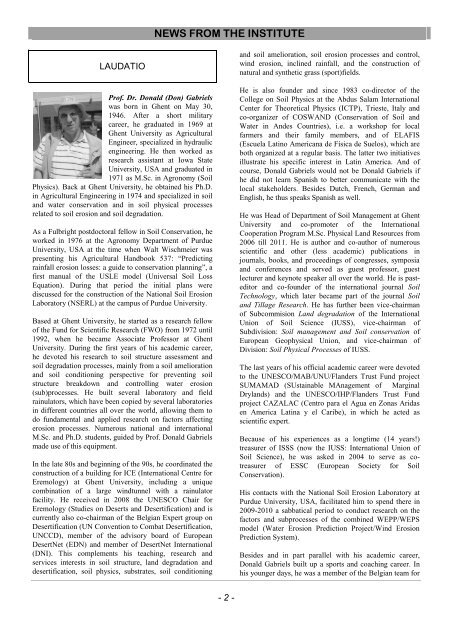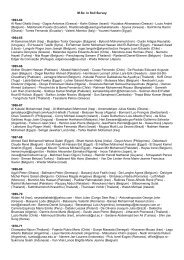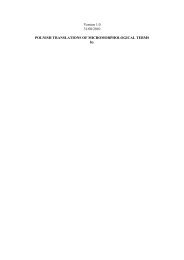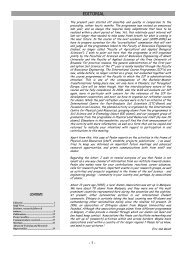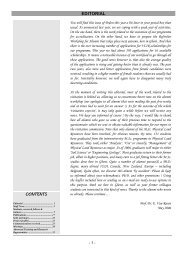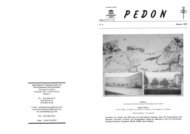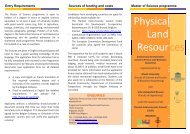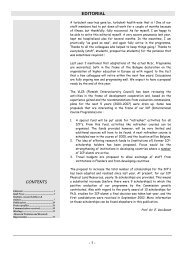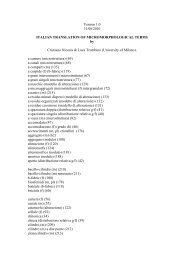Pedon 23 - Physical Land Resources - Universiteit Gent
Pedon 23 - Physical Land Resources - Universiteit Gent
Pedon 23 - Physical Land Resources - Universiteit Gent
You also want an ePaper? Increase the reach of your titles
YUMPU automatically turns print PDFs into web optimized ePapers that Google loves.
NEWS FROM THE INSTITUTE<br />
LAUDATIO<br />
Prof. Dr. Donald (Don) Gabriels<br />
was born in Ghent on May 30,<br />
1946. After a short military<br />
career, he graduated in 1969 at<br />
Ghent University as Agricultural<br />
Engineer, specialized in hydraulic<br />
engineering. He then worked as<br />
research assistant at Iowa State<br />
University, USA and graduated in<br />
1971 as M.Sc. in Agronomy (Soil<br />
Physics). Back at Ghent University, he obtained his Ph.D.<br />
in Agricultural Engineering in 1974 and specialized in soil<br />
and water conservation and in soil physical processes<br />
related to soil erosion and soil degradation.<br />
As a Fulbright postdoctoral fellow in Soil Conservation, he<br />
worked in 1976 at the Agronomy Department of Purdue<br />
University, USA at the time when Walt Wischmeier was<br />
presenting his Agricultural Handbook 537: “Predicting<br />
rainfall erosion losses: a guide to conservation planning”, a<br />
first manual of the USLE model (Universal Soil Loss<br />
Equation). During that period the initial plans were<br />
discussed for the construction of the National Soil Erosion<br />
Laboratory (NSERL) at the campus of Purdue University.<br />
Based at Ghent University, he started as a research fellow<br />
of the Fund for Scientific Research (FWO) from 1972 until<br />
1992, when he became Associate Professor at Ghent<br />
University. During the first years of his academic career,<br />
he devoted his research to soil structure assessment and<br />
soil degradation processes, mainly from a soil amelioration<br />
and soil conditioning perspective for preventing soil<br />
structure breakdown and controlling water erosion<br />
(sub)processes. He built several laboratory and field<br />
rainulators, which have been copied by several laboratories<br />
in different countries all over the world, allowing them to<br />
do fundamental and applied research on factors affecting<br />
erosion processes. Numerous national and international<br />
M.Sc. and Ph.D. students, guided by Prof. Donald Gabriels<br />
made use of this equipment.<br />
In the late 80s and beginning of the 90s, he coordinated the<br />
construction of a building for ICE (International Centre for<br />
Eremology) at Ghent University, including a unique<br />
combination of a large windtunnel with a rainulator<br />
facility. He received in 2008 the UNESCO Chair for<br />
Eremology (Studies on Deserts and Desertification) and is<br />
currently also co-chairman of the Belgian Expert group on<br />
Desertification (UN Convention to Combat Desertification,<br />
UNCCD), member of the advisory board of European<br />
DesertNet (EDN) and member of DesertNet International<br />
(DNI). This complements his teaching, research and<br />
services interests in soil structure, land degradation and<br />
desertification, soil physics, substrates, soil conditioning<br />
and soil amelioration, soil erosion processes and control,<br />
wind erosion, inclined rainfall, and the construction of<br />
natural and synthetic grass (sport)fields.<br />
He is also founder and since 1983 co-director of the<br />
College on Soil Physics at the Abdus Salam International<br />
Center for Theoretical Physics (ICTP), Trieste, Italy and<br />
co-organizer of COSWAND (Conservation of Soil and<br />
Water in Andes Countries), i.e. a workshop for local<br />
farmers and their family members, and of ELAFIS<br />
(Escuela Latino Americana de Física de Suelos), which are<br />
both organized at a regular basis. The latter two initiatives<br />
illustrate his specific interest in Latin America. And of<br />
course, Donald Gabriels would not be Donald Gabriels if<br />
he did not learn Spanish to better communicate with the<br />
local stakeholders. Besides Dutch, French, German and<br />
English, he thus speaks Spanish as well.<br />
He was Head of Department of Soil Management at Ghent<br />
University and co-promoter of the International<br />
Cooperation Program M.Sc. <strong>Physical</strong> <strong>Land</strong> <strong>Resources</strong> from<br />
2006 till 2011. He is author and co-author of numerous<br />
scientific and other (less academic) publications in<br />
journals, books, and proceedings of congresses, symposia<br />
and conferences and served as guest professor, guest<br />
lecturer and keynote speaker all over the world. He is pasteditor<br />
and co-founder of the international journal Soil<br />
Technology, which later became part of the journal Soil<br />
and Tillage Research. He has further been vice-chairman<br />
of Subcommision <strong>Land</strong> degradation of the International<br />
Union of Soil Science (IUSS), vice-chairman of<br />
Subdivision: Soil management and Soil conservation of<br />
European Geophysical Union, and vice-chairman of<br />
Division: Soil <strong>Physical</strong> Processes of IUSS.<br />
The last years of his official academic career were devoted<br />
to the UNESCO/MAB/UNU/Flanders Trust Fund project<br />
SUMAMAD (SUstainable MAnagement of Marginal<br />
Drylands) and the UNESCO/IHP/Flanders Trust Fund<br />
project CAZALAC (Centro para el Agua en Zonas Aridas<br />
en America Latina y el Caribe), in which he acted as<br />
scientific expert.<br />
Because of his experiences as a longtime (14 years!)<br />
treasurer of ISSS (now the IUSS: International Union of<br />
Soil Science), he was asked in 2004 to serve as cotreasurer<br />
of ESSC (European Society for Soil<br />
Conservation).<br />
His contacts with the National Soil Erosion Laboratory at<br />
Purdue University, USA, facilitated him to spend there in<br />
2009-2010 a sabbatical period to conduct research on the<br />
factors and subprocesses of the combined WEPP/WEPS<br />
model (Water Erosion Prediction Project/Wind Erosion<br />
Prediction System).<br />
Besides and in part parallel with his academic career,<br />
Donald Gabriels built up a sports and coaching career. In<br />
his younger days, he was a member of the Belgian team for<br />
- 2 -


